I had planned to stay away from the 2024 election as oceans of ink will be spilled on this subject, but I found that despite all the coverage a number of very interesting datapoints have been ignored in the media. They paint a fascinating picture and I am sharing that analysis here (this was done at the point when 348/350 seats had been declared). Firstly, pretty well everyone has noticed the major disconnect between the share of votes and the share of parliamentary seats, as illustrated in this chart.
The losers from these arrangements will doubtless lobby for some form of proportional representation. You may remember that I postulated that one of the reasons that the Reform UK charade was being pushed was to increase turnout, whilst not interfering with a Labour-Agenda 2030 majority, exactly as above. The more interesting data, which has largely been ignored is the actual number of votes that parties achieved. When looking at vote shares, you are looking at a combination of vote numbers and voter turnout which gets confusing. So the first big surprising statistic for me was that the top four parties all lost votes between 2019 and 2024. They lost an aggregate 8.5 million votes, of which 7 million were lost by the Fake-Conservatives alone.
It is clear that the election was primarily a massive no vote against the Fake-Conservatives who achieved their lowest voter share in more that one hundred years. The extent of the rout is phenomenal. It is also clear from the above chart that the voters were not at all inspired by the programs offered by the other three major parties.
If you look at actual votes received, you can see the quite stunning result that Labour actually also received far fewer votes in 2024 (around 9.6 million) than in 2019 and 2017 even though they achieved the paradoxical outcome of obtaining many more seats in 2024. In reality the party is far less popular under Sir Kier Starmer than under the “unelectable” Jeremy Corbyn and its apparent success is really just a reflection of the Fake-Conservatives failure.
Things get even more interesting when we start looking at who was able to pick up votes from people fleeing all four of the larger UK parties, this is shown in the table in the footnotes1. The stand-out winner was of course Reform UK (formerly the Brexit Party until 2022), which increased its votes by around 3.4 million and achieved 4 million votes. Also the Green Party increased its votes up to around 1 million achieving almost 2 million votes. Even with those increases, there was still a net reduction in votes cast in 2024 of 3.5 million with turnover going down to around 60%.
A turnout of 60% is not the end of the world and is higher than 2001 and around the same level as 2005. This confirms another one of my hypothesis that the whole “I do not consent” movement would achieve next to nothing. More interestingly, you can imagine what would have happened without Reform UK. Without Reform UK it is likely that turnout could have dropped to just over 50% if many of those voting Reform would not have voted at all, a not unlikely hypothesis.
I can only speculate as to what extent Reform UK peeled voters away from the Conservative party versus being used as a vehicle simply to capture some of the fleeing 7 million Conservative voters? I have argued in my previous posts that Reform UK is an establishment charade given that the party’s leadership supported much of the COVID tyranny. Also the wall-to-wall mainstream media coverage that the party received was a major red flag, even if a lot of the coverage was negative. Below is sample of one day’s worth of mainstream media coverage.
Did liberty die in Bognor Regis
One of the most depressing parts of the election saga has been the failure to back those handful of seemingly decent souls who did actually stand up to COVID tyranny. David Kurten’s vote share in Bognor Regis was amazingly low, especially given that he has had some media exposure. The voting dynamics in Bognor Regis seem to confirm another hypothesis which was that Reform UK was pushed in order to take the wind out of the sails of real anti-establishment parties. The result suggest that the people fleeing the Conservative Party were scooped up by Reform UK and to some extent by Labour in this constituency.
Would Heritage have been able to achieve 5%, 10%, 20% in the absence of Reform?
Conclusion
The battle for liberty looks to be pretty challenging, I thought that the ideas below were fairly non-controversial, but it seems that relatively few people buy into these propositions:
There are God-given inalienable rights which cannot be taken away by the State (especially informed consent).
The COVID tyranny was a gross abuse of state power and libertarians should not support people who cooperated with that tyranny.
What people actually do is a lot more important than what they say.
There is no realistic possibility of opting-out of the system, so it is better to work to change it.
I have written before about Sir John Glubb’s excellent analysis “The Fate of Empires” which charts the typical trajectory of an empire over 250 years from rise to fall. It seems pretty clear that we are in what he described as the “age of decadence”. His conclusion that recovery is the inevitable outcome provides optimism, however the timescales involved are depressingly long2. So I never expected any quick wins, but it is still a shame that many people in this election seemed happier to vote for their oppressors, rather than supporting champions of individual liberty.
Let me have your thoughts below and please don’t forget to circulate our material and support our work, we have already had to suspend various parts of our activities due to lack of funding. So please upgrade to paid subscriber status, or support us on Patreon (https://www.patreon.com/ThinkingSlow)!
Alex Kriel is by training a physicist and was one of the first people to highlight the flawed nature of the Imperial COVID model3, he is a founder of the Thinking Coalition which comprises a group of citizens who are concerned about Government overreach (www.thinkingcoalition.com)
“After, perhaps, several generations (or even centuries) of suffering, the impoverished nation has been purged of its selfishness and its love of money, religion regains its sway and a new era sets in.”





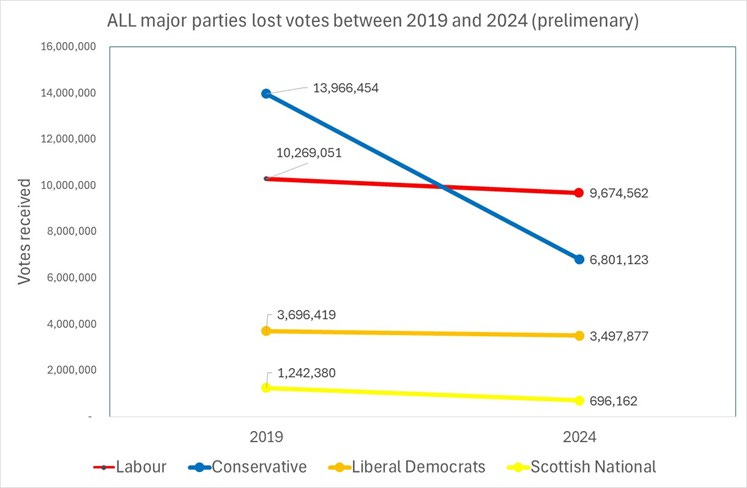
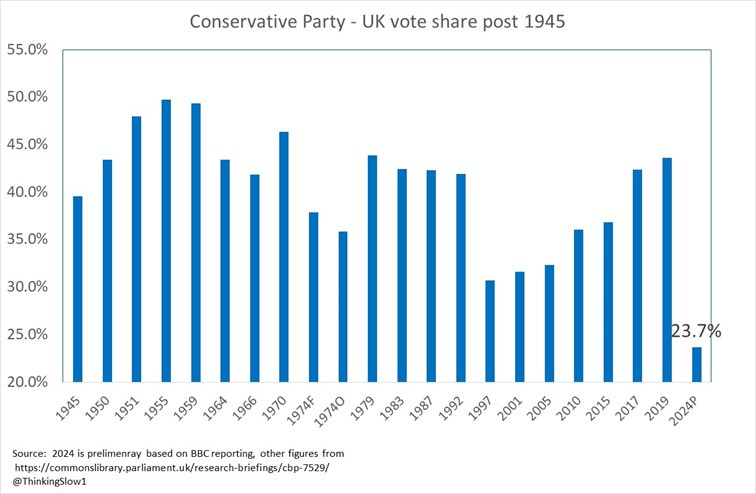
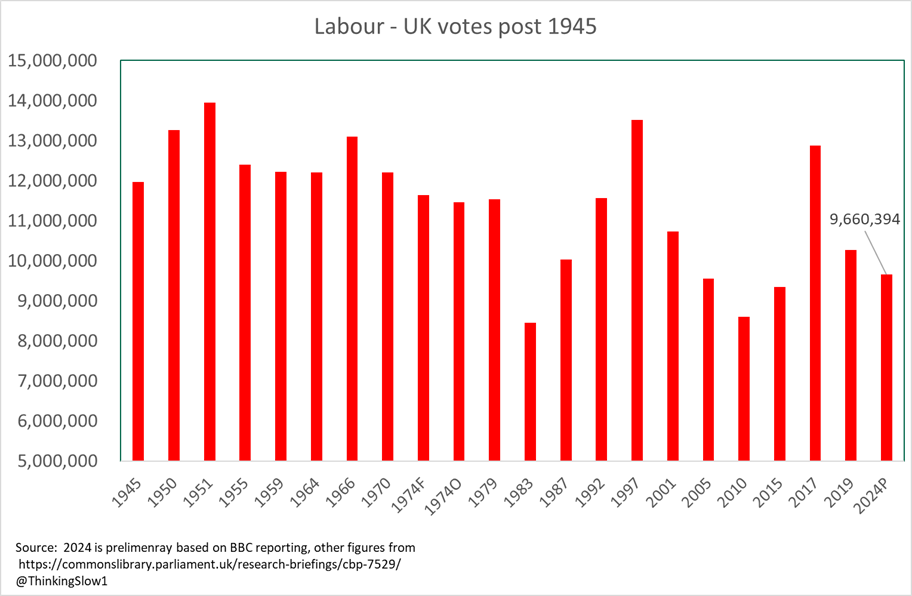
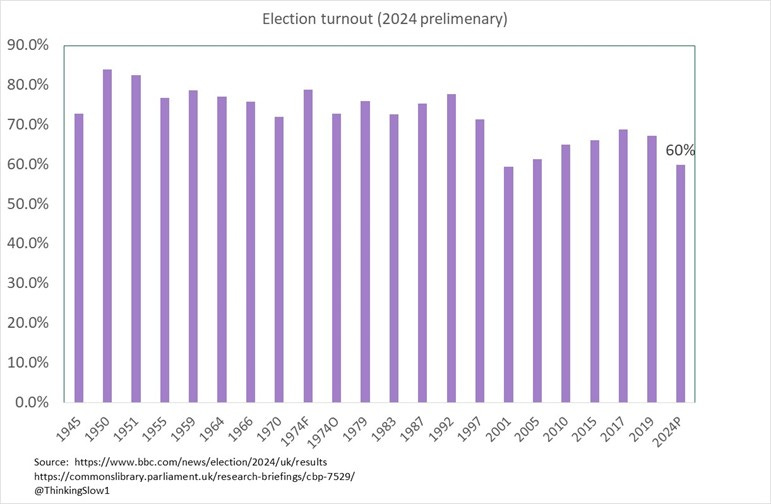
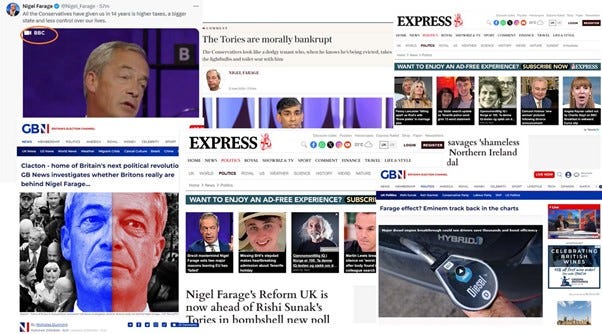


"Working with the system may require backing Reform. For no other reason than support for changing the 'first pass the post system'
If successful, this will give parties like Heritage a chance?